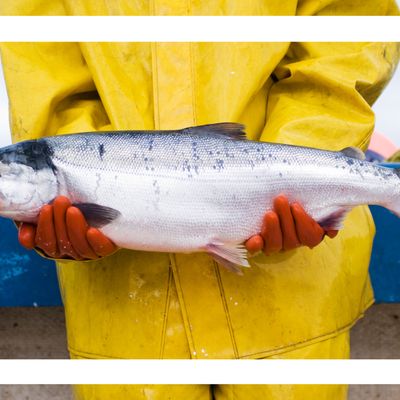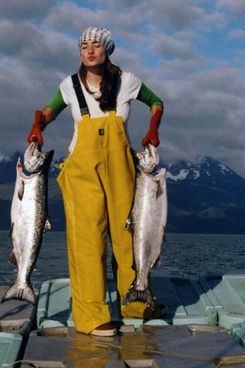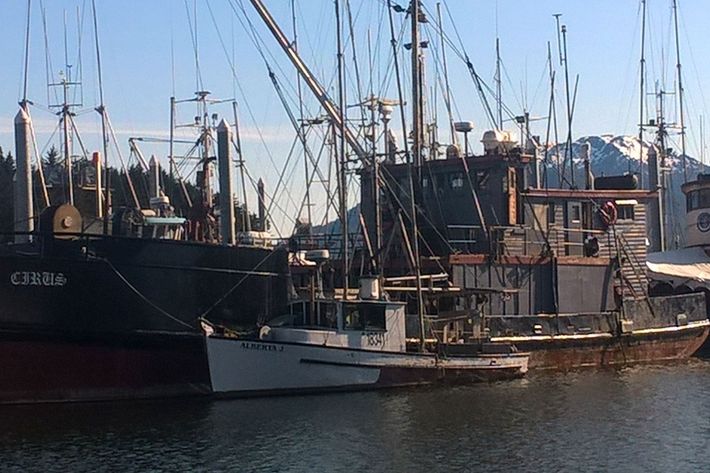
Alexis Abercrombie, 34
Fisherwoman
Juneau, Alaska

I’d gone to boarding school in Europe, which is where my parents were living at the time. My friends and I lived the typical nightlife that many young European girls do. I was totally caught up in that lifestyle of clothes and fashion and going out. I loved it. I did some modeling. I didn’t love it. It became predictable. The scrapping to be adored for my beauty, I could see how limiting it was already and how I wasn’t going to be satisfied with it.
I was 23 when I first came up here with a dear friend of mine. It was all based off of his dream. He woke up in the middle of the night and said, “We need to go to Alaska.” So we did it.
We were down to $9 when we finally got to Sitka, and we decided that, okay, we’re going to have to walk the docks and get a job. One of the first people we met on the docks hired us.
Most people come up here and they work for a season, and then they go back to California or Florida. By all means, that was my intention. The first year, we did a season, and then I left. But the guy that hired me, as I was walking away that first season, he said, “You’ll be back.”
There’s just something up here. These are really natural people. There’s not a lot of words going on. But there is a whole wealth of knowledge of manipulating the physical world. It was fascinating to me and it still is. It’s just a raw, real place. And it is a place where I really felt I could grasp it with my own hands and craft the American dream.
The first healthy dose of Alaskan mentality was when I met Mark. He was a fisherman, and bought his own boat when he was 17. He is just your quintessential grizzly-bear motherfucker who never goes to sleep. That’s a Beck lyric, but it’s totally appropriate. This is a person who never left Alaska. He hardly ever left Tee Harbor, which is a tiny homestead harbor outside Juneau.
He only had one eye. He was an amazing captain at sea. He could see for miles and miles. Mark could tell the name of a boat miles away just from looking at its outline.
I was attracted to him because I was learning from him. It’s definitely an apprenticeship. I learned how to mend Dungeness nets on his boat, the Blue Harvest. I learned how to weld railings on a boat, to bait hooks for longlining. You can’t get a degree in this stuff.
Mark took me longlining for Pacific cod that winter. Longlining involves baiting hooks with squid or herring, letting out a long line which sinks to the bottom of the ocean floor and pulling up bottom-dwelling fish — cod, Pacific cod, halibut, black cod. For Pacific cod, you might have 300 yards of line with hooks every six feet. You put the hooks into circular crates in a spiral so that they’re easy to grab and you can stack them on top of each other. Eventually, I bought my own fishing boat, a troller.
There are different fisheries for salmon. Fishermen are for the most part out at sea. They’re busy fishing. For them to have to come back to land and deliver all of their fish is a big waste of time and money for everybody involved, including the fish buyer and the fishermen. Sometimes, I do what’s called tendering. Tenders are kind of a middleman. We go out to the fishing grounds and pay the fishermen for their fish. We grade the fish, inspect them, and then we bring them back to the buyer on land where they process the fish and get it ready for market sale. So it’s a middle step that makes everything more efficient.
There’s seining and gillnetting, where you use a net. Trolling is where you’re using hook-and-line fishing for the highest-quality salmon — king salmon or coho. There are four lines on a troller. It’s just like fishing with a pole except imagine that the line on the pole goes way further out and way deeper down, with way more hooks on it. You’re catching multiple fish on multiple lines at a time. You’re bringing the fish in using hydraulic power.
Salmon are an exquisite animal. What the salmon goes through — its life cycle — is impressive, no doubt. A few days after I got the troller, I was gaffing king salmon from the pit. A gaffe is a stick with a big hook at the end of it. And you smash the hook through the fish’s head to bring it onboard from the stern as it comes up to the boat so you don’t lose it on the line as you lift it out of the water.

King salmon have this incredibly alive presence. Right before you’re ready to put the gaffe on the king salmon’s head, they look at you and they’ll dodge the gaffe. They’re a very smart fish compared even to their brother the coho. I’ve developed such an appreciation for the king salmon and his intelligence. Their dependability in and of itself is such a blessing to me.
This is an American birthright. I never realized it until I got to Alaska and really saw the generosity of the land here. It’s something that you can’t appreciate until you are a benefactor of the resources of our beautiful country. It’s so humbling and you become so grateful that you can even be a part of it.
I always have to remind myself of that. Because it’s really a tough life up here. You really have to believe in it when you’re pulling up cod gear in the winter, sick as a dog with freezing fingers and snot running down your face, seasick and stuck on a boat with a whiskey-drunk captain.
When you’re on a boat, you kind of have to be everything — the ultimate problem solver. You’re out there in the middle of nowhere and you lose, let’s say, like a problem of mine on a recent tender, we lost the exhaust. You’ve got to know how to weld it back on. You’ve just got to be crafty. You’ve got to be a mechanic. Not to mention the diplomacy you have to have with your crew onboard, their safety obviously. There is just an awful lot going on. Also the stress of delivering millions of dollars’ worth of fish on time. I was at one point abandoned with my 4-year-old son to run my fishing boat on my own. It was overwhelming and scary. It was a complete disaster to be honest.
When it’s hard sometimes, I think of blow-drying my hair in a pink bathroom. That’s my comforting place of mental retreat. Still, I never cease to feel special for being a part of the lifestyle. I don’t actually want to be in the pink bathroom.
As I get older I sometimes question my choices because it has been so unstable and unpredictable. But I’m in this. Honestly, what am I going to do now? This is the only thing I know how to do. And I think that is true for a lot of these guys. You get into this stuff and you’ve relinquished 15 years of your life to it, and you suddenly look around and say, “Okay, I know how to run a boat now. But that’s about it.” [Laughs.] I completely forsook my college education. I used the money that my generous parents had saved for my college education, and I threw it all into buying this 86-foot tender when I was 25 years old. I’m completely invested in this world. There is no turning back.
I think a lot of the people just can’t get away from this because it’s so much more full of life than sitting in front of a computer screen and knowing that you’re going to be able to come home every night and watch Seinfeld. It’s man versus nature, which is always going to be more fun to me than man versus man, which to me is so predictable.
It’s not just the work itself. There is a whole community of fishermen up here. I’ve been lucky in that I really feel like I’m a part of something. That’s a feeling that people are going after, like they’re a part of something that matters.
I think that as much as people say they do their jobs because they love their jobs, and this and that, ultimately, it always boils down to the kind of characters that you’re around and the kind of people that you want to look in the eye and have a conversation with every day. For me, I could never have gone into accounting or into a law firm. The reality is that I could’ve never been inspired by that environment or those people.
The trollers in Sitka in particular are so communal. It’s such a sense of family when you’re on the dock and everyone is talking about what they caught — or didn’t catch, more likely. It’s just nice at the end of the day of fishing to go sit at the P Bar, the Pioneer Bar, and listen to everybody’s stories. I could just sit around forever and listen to them. Even if you don’t catch any fish, at least you still got that.